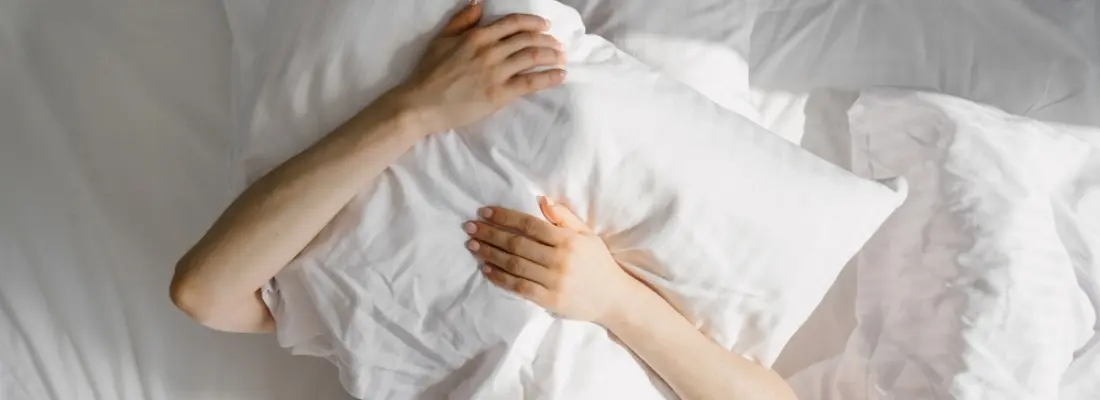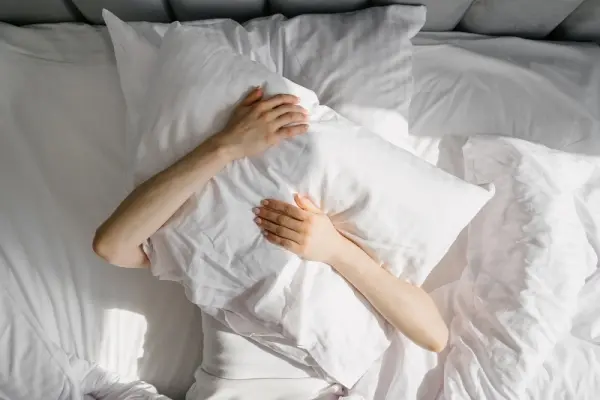
Do you ever feel like your brain hits the gas pedal just when it’s time to rest? For many living with ADHD, that nightly battle to fall asleep is more than just a bad habit. It’s a deeply rooted connection between neurodiversity and disrupted sleep cycles. Attention-Deficit/Hyperactivity Disorder (ADHD) and insomnia are two common conditions that often go hand in hand, especially in adults. While ADHD affects focus, impulsivity, and emotional regulation during the day, it also disrupts something equally essential at night: your ability to rest. Studies show that up to 66.8% of adults with ADHD report chronic insomnia, compared to just 28.8% in the general population. In this blog, we’ll explore how ADHD and insomnia are linked, why sleep problems are frequently misdiagnosed, and how telehealth and personalized sleep care can make a significant difference.
Why Someone with ADHD Would Have Insomnia
Several factors contribute to the increased risk of insomnia in individuals with ADHD:
- Cognitive Hyperarousal: Many individuals with ADHD experience racing thoughts and difficulty quieting their minds, especially at night. This heightened state of alertness can significantly delay sleep onset.
- Circadian Rhythm Disruption: ADHD is often associated with irregular sleep-wake cycles, which can make it difficult to fall asleep and wake up at conventional times.
- Medication Side Effects: Certain ADHD medications, particularly stimulants, can interfere with sleep patterns, contributing to insomnia.
- Comorbid Conditions: The presence of other mental health disorders, such as anxiety and depression, is common among those with ADHD and can exacerbate sleep problems.
What Is the Link Between ADHD and Insomnia?
ADHD and insomnia are closely linked, with many individuals who have ADHD experiencing sleep disturbances. People with ADHD often struggle with hyperactivity, racing thoughts, and difficulty regulating their attention, which can interfere with the ability to relax and fall asleep. However, these challenges can result in delayed sleep onset, frequent awakenings at night, and poor sleep quality. Additionally, stimulant medications commonly used to treat ADHD can contribute to insomnia, further complicating sleep patterns. As a result, managing both ADHD and insomnia requires addressing both the neurological aspects of ADHD and the sleep-related issues that often accompany it.
Signs of Sleep Disturbances in People with ADHD
People with ADHD often show unique signs of poor sleep. Unlike typical insomnia, they may not report difficulty sleeping. Instead, the signs often include:
- Trouble falling asleep despite being tired
- Frequent waking during the night
- Restlessness or tossing and turning
- Trouble waking up in the morning
- Moodiness, impulsivity, or difficulty concentrating during the day
How Poor Sleep Makes ADHD Symptoms Worse
Poor sleep doesn’t just affect energy; it also intensifies ADHD symptoms. Lack of restorative rest increases hyperactivity, impulsivity, and irritability. A study found that sleep-deprived individuals with ADHD scored 20% lower in attention and working memory tasks. Even one night of disrupted sleep can lead to poor focus and emotional regulation. Over time, chronic sleep loss reduces quality of life and worsens treatment outcomes for ADHD.
Why ADHD-Related Insomnia Is Often Misdiagnosed
Healthcare providers frequently miss ADHD-related insomnia. That’s because the symptoms of insomnia and ADHD are often similar. Sleep-deprived individuals may appear inattentive, forgetful, or impulsive.
Many people are treated for ADHD without ever being screened for sleep problems. Misdiagnosis can lead to overmedication or the wrong treatment. Additionally, stimulant medications may worsen insomnia if not correctly managed.
Struggling to Get a Good Night’s Sleep?
Explore effective insomnia treatments designed to help you sleep better and wake up refreshed.
How Telehealth Can Help Manage ADHD and Insomnia Together
Managing ADHD and insomnia requires coordination between mental health and sleep specialists. This is where telehealth becomes incredibly valuable. Patients can access customized treatment plans from home through platforms like Home Sleep Centre. Telehealth makes it easier to:
- Meet with a sleep doctor without travel.
- Monitor sleep behavior and routines remotely.
- Adjust medications and lifestyle habits under professional guidance.
- Receive CBT-I (Cognitive Behavioral Therapy for Insomnia) online.
Tips to Improve Sleep Hygiene in ADHD
Improving sleep hygiene can significantly reduce insomnia symptoms in ADHD. Here are proven strategies:
- Stick to a consistent sleep schedule, even on weekends
- Avoid screens at least 1 hour before bedtime
- Use blackout curtains or white noise machines
- Engage in calming bedtime routines like reading or meditation
- Avoid caffeine after 2 p.m.
- Limit long naps during the day.
When to Get a Sleep Evaluation
It’s time to seek a sleep evaluation if you experience these signs:
- Staying awake for hours at night.
- Waking up feeling tired despite a whole night’s sleep.
- Snoring loudly or gasping during sleep
- Falling asleep during the day at inappropriate times
- ADHD symptoms worsen with no apparent cause
What Research Says About ADHD and Insomnia
Scientific data supports a strong link between insomnia and ADHD. A 2019 study showed that up to 73% of children with ADHD reported significant sleep disturbances. Another report found that adults with ADHD are two to three times more likely to suffer from chronic insomnia. Furthermore, evening chronotype, or a natural tendency to stay up late, is more common in people with ADHD, leading to late sleep onset and reduced rest.
ADHD, Insomnia, and Quality of Life
Both ADHD and insomnia can severely impact a person’s quality of life. Sleep loss affects mental performance, emotional balance, and physical health.
Chronic insomnia can lead to:
- Increased anxiety and depression
- Poor academic or job performance
- Relationship conflicts
- Higher risk of accidents
The Impact of Insomnia on Individuals with ADHD
The coexistence of ADHD and insomnia can have a profound effect on various aspects of life:
- Cognitive Functioning: Sleep deprivation can impair attention, memory, and executive function, which are already areas of challenge for individuals with ADHD.
- Emotional Regulation: Lack of sleep can heighten irritability and mood swings, making it more challenging to manage emotions.
- Quality of Life: The combination of ADHD and insomnia often leads to a decreased quality of life, affecting work performance and social interactions.
Treatment Approaches for ADHD and Insomnia
Addressing both ADHD and insomnia simultaneously is crucial for effective management:
- Behavioral Interventions: Cognitive Behavioral Therapy for Insomnia (CBT-I) has been shown to improve sleep quality in individuals with ADHD.
- Medication Management: Adjusting ADHD medications to minimize sleep orders can be beneficial. It’s essential to consult with a healthcare provider to tailor treatment plans.
- Sleep Hygiene Education: Implementing consistent sleep routines, reducing screen time before bed, and creating a conducive sleep environment can help improve sleep quality.
Final Thoughts
Living with ADHD insomnia is quite overwhelming, but with proper care, better sleep is achievable. Whether you’re newly diagnosed or have struggled for years, addressing sleep can transform your daily functioning. Like those offered by Home Sleep Center, Telehealth services make access easier than ever. The link between ADHD and insomnia is well-documented, with each condition potentially exacerbating the other. With appropriate treatment strategies, individuals can experience significant improvements in both sleep quality and overall functioning.
Ready to Book Your Appointment?
Take the first step toward better health—schedule your visit now with our expert team.

